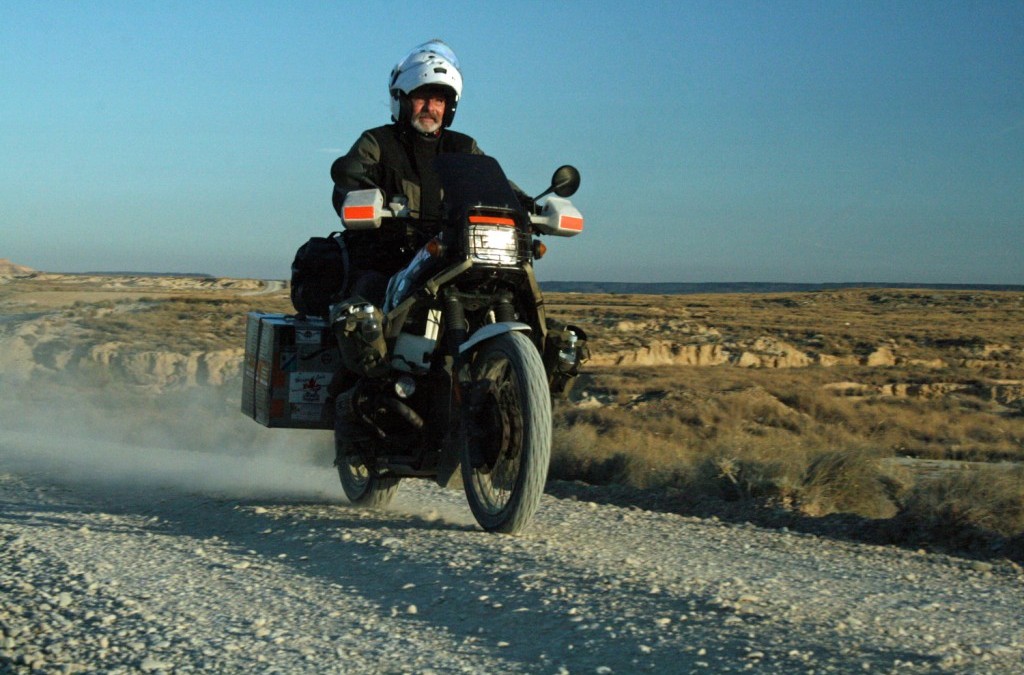This is an abridged version of a full-length article that appears in the premiere issue of the ePublish Yourself! e-zine, available on ISSUU.
Four books and several hundred thousand miles later, Sam Manicom has established himself in a uniquely adventure-filled realm: motorcycle travel writing. Traversing roads that span several continents, venturing into regions where he was not always welcome, and encountering the best and worst in human nature, Manicom combines a relaxed writing style and an observant eye with a natural flair for storytelling.
Along the way, Manicom has steadily built a strong readership and a stable career around what he loves to do the most: traveling down unexplored roadways on his BMW motorcycle.
ePublish Yourself: How have your experiences changed your ideas and notions of travel and adventure?
Sam Manicom: I’ve been travelling in one way or another for most of my life, so the way I feel about adventure has grown slowly over the years. I now think that everyone creates their own journey, and everything is subject to chance. I also think that a person makes their own journey a success or not.
In the end, a lot of what makes a great trip comes down to having a positive attitude and an open mind—a curiosity and a willingness to delve into the unknown. Enjoying people is also a massive advantage because they can give a journey a layer of quality that can’t be obtained in any other way. It’s too easy to skim across the surface of a country, but spending real time with local people prevents that from happening.
The other important thing is the full-on awareness that when something goes wrong, that’s not a bad thing unless you let it be. Actually it is the beginning of a new adventure, and adventure is a large part of why we are out there, isn’t it?
EY: What should new writers with a book project in mind do to get started?
SM: A new author is setting out into a new country. The publishing world has its own borders, customs, history, traditions, language, hierarchy, and so on. It’s quite fascinating. An author needs to treat this as if travelling into the unknown. All senses have to be awake and working hard. It’s a very exciting time.
On one hand, there are huge kudos attached to being published by a publishing house. And there’s no doubt that all the skills of their staff, including editing, design, printing, promotion, and more, are a terrific advantage. So is the fact that retailers pay far more attention to a book when it comes from a big publishing house.
Of course, there are all sorts of games involved too. For example, one of the keys is being able to prove who your target market is, and to show publishers that your book is good enough to feed the hunger of that market.
However, there are several disadvantages to trying to find a publisher, as I see it. Approaching a publisher takes a huge amount of time. That’s a problem if your book is time sensitive. Plus, you lose editorial control. Then, in the end, authors get a very small percentage of the cover price which, of course, is at the publishing house’s discretion.
It’s very hard. And many publishing houses don’t even send out refusal letters anymore. I was always perversely delighted when I got one!
Ebooks offer another option, with certain advantages. Many people today simply don’t want their books taking up space (as hard copies do). Instead, they want the convenience and portability that ebooks offer. They also want to be able to instantly download a book and avoid a trip to the shops (not knowing if a particular book will be in stock, for instance).
And then there are situations where a publishing house has seen the sales of an ebook and has taken the book on to publish in print. Ebooks are therefore a great way to get yourself noticed, beyond the traditional ways of finding an audience. The whole concept of ebooks is very exciting and, I think, a huge opportunity.
EY: What’s your best advice about promoting a book in the age of social media?
SM: You have to have a good website. It needs to be fast, easy to use, uncomplicated, with useful information and you can’t let it sleep. You need new stuff happening on it all the time.
You also need to be on Facebook and Twitter. I was dragged almost screaming to those forums, but I now know the tremendous value of them. There are side advantages too; you get to know some of your readers a bit, you meet up with people you’d lost contact with, and so on.
The best advice though? Constantly look for ways to pop the title of your book above the crowd. This, for me, is the hardest thing I do. Self–promotion is a very alien thing. It doesn’t fit with who I am, but you have to do it.
EY: What advice would you share about the writing process?
SM: Lots! To begin, only write about what you know and are passionate about. And know who you are writing for. Personally, I brainstorm and then go through and edit out anything that might be of interest only to me, but not to anyone else. Your book must have a reason for being.
Also, your book has to grab people from the first paragraph, weaving a thread, or group of threads, that follow throughout. Books come alive if you can get all the reader’s senses singing. Include how things smell, what they sound like, how they taste, and what they look like. If your reader can’t be with you in the situation, you aren’t doing your job well.
On the flip side, don’t try to be funny if you aren’t. Just be yourself. And just as importantly, be honest. Don’t be afraid to show your feelings.
Also be aware that editing is critical. My first full Into Africa manuscript was 200,000 words long; the final book just over 120,000 words.
Finally, don’t take too much advice from too many people. It’ll just confuse you. Limit your advisors to no more than three people, one of whom is your editor.
When writing a book, enjoy the parts that you love and value that time. But also enjoy the challenges you come across. You are on a never-ending and quite wonderful learning curve. Yes, there are hard times, but they don’t last, unless you let them.

